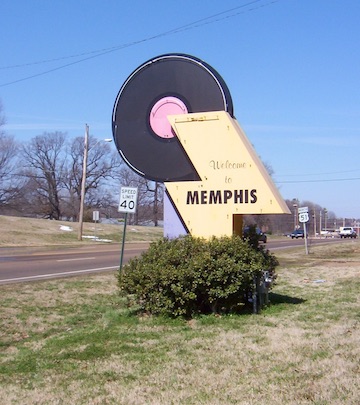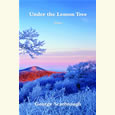Bookends
A bookseller recalls the excruciating final weeks of a beloved Memphis institution—and looks to a new store’s future
It was my first shift at the bookstore after Christmas—the calm week after the retail storm. I had just stepped into the breakroom to put down my things and clock in for my night shift when I saw Eddie Burton, the store’s general manager, standing there somewhat awkwardly. He was waiting for me.
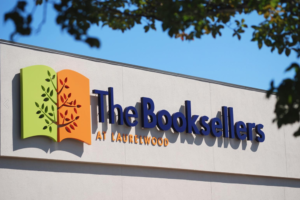 “Hey, Kat,” he said. “When you get clocked in, could you come find me? I need to talk to you about something.”
“Hey, Kat,” he said. “When you get clocked in, could you come find me? I need to talk to you about something.”
With a sudden lurch in my stomach, a “What did I do?” feeling of foreboding, I made my way to his office.
It was much worse than a reprimand for some misstep during the store’s busiest season of the year. Instead, Eddie told me that Neil Van Uum, owner of The Booksellers at Laurelwood, was closing the store. We talked in Eddie’s office for forty-five minutes. I cried. Eddie looked pained—and exhausted. Because he couldn’t stand the thought that we might hear the news through the grapevine or read it in the newspaper, he spent the week after Christmas sitting each and every bookseller down, one by one, and telling us the terrible news. Happy New Year!
This is the same Eddie whom I had to call at 7 a.m. on Christmas Eve—his first day off in a week—when I found the store’s basement flooded. The same Eddie who had worked at Davis-Kidd, the Booksellers’ predecessor store, on the day it opened more than thirty years ago. The same Eddie who met his wife of twenty-plus years at the store one night when a woman whom he’d seen around but never spoken to before offered to help him move the heavy remainder tables inside as the store was closing. He didn’t need help but wanted to talk to her—they had a drink afterward, and the rest is history. He told me this story as he helped me drag the same tables out one morning, during one of our last shifts at The Booksellers.
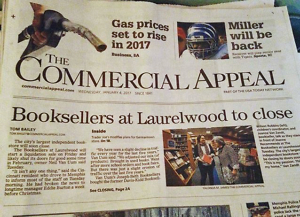 A day or two after I found out the store was closing I got much worse news: a precious childhood friend had died in a car accident. A friend who had worked at both Davis-Kidd in Memphis during college and Davis-Kidd in Nashville after graduation. We lived a block from each other as kids, went to kindergarten together, shared countless childhood and adolescent memories, but our adult bond was built around books. Just a couple of weeks before she died, we’d exchanged emails about how much we enjoyed our old friend Daniel Connolly’s new nonfiction release, The Book of Isaias.
A day or two after I found out the store was closing I got much worse news: a precious childhood friend had died in a car accident. A friend who had worked at both Davis-Kidd in Memphis during college and Davis-Kidd in Nashville after graduation. We lived a block from each other as kids, went to kindergarten together, shared countless childhood and adolescent memories, but our adult bond was built around books. Just a couple of weeks before she died, we’d exchanged emails about how much we enjoyed our old friend Daniel Connolly’s new nonfiction release, The Book of Isaias.
I started 2017 throbbing with an intimate kind of sadness that I nevertheless seemed to share with nearly everyone I knew. There was hardly a person in my orbit—or in Memphis—who didn’t love the bookstore, or Sarah, or both.
The Saturday when I missed work to attend Sarah’s memorial in Nashville was the first Saturday of the liquidation sale, and the single highest-grossing day in store history. My coworkers told me there were lines from the registers all the way back to the kids’ section. The day had been so terrible that Eddie expected the staff to start quitting early. Unemployment had to be better than facing that kind of dispiriting insanity again.
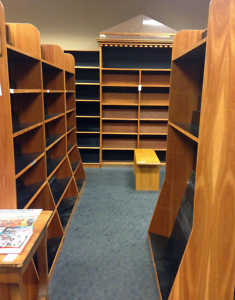 But it didn’t happen that way. Instead, we just sort of… slogged through. During those weeks customers would share so many memories with me, often with tears in their eyes. In one—the one that made me get weepy right there at the register—a mother of nearly grown kids recounted the way her own mother had bought each of her three grandchildren a book from our store every Christmas for their entire lives. Their home contained a library of all of these lovingly selected volumes from the very store that was disappearing all around us.
But it didn’t happen that way. Instead, we just sort of… slogged through. During those weeks customers would share so many memories with me, often with tears in their eyes. In one—the one that made me get weepy right there at the register—a mother of nearly grown kids recounted the way her own mother had bought each of her three grandchildren a book from our store every Christmas for their entire lives. Their home contained a library of all of these lovingly selected volumes from the very store that was disappearing all around us.
That story hit home because of my own family’s connection to the store. Months before we heard the bad news, my mom and I had entertained ourselves over lunch in the Bistro one day trying, and for the most part failing, to remember where we had shopped for books before Davis-Kidd opened.
Oh, the love Memphis showed us in those weeks. On any given shift there might appear giant boxes of Dinstuhl’s chocolates, sandwich trays or barbecue, and homemade baked goods, including several rounds from my own mom. (I don’t see how any non-employee could have taken the news harder than she did.) School kids wrote us heartbreaking notes, and people wrote supportive (and despairing) letters to the editor of the newspapers in town.
Emmett Miskell, a student from White Station High School, started an online campaign to save the store; when it became clear that saving it wasn’t possible, the petition became a way simply to show support and encourage someone else to open a new bookstore. Burke’s Book Store, our fellow independent bookseller, went far out of its way to support us. After Booksellers finally closed, I wandered into Burke’s one day, a bookstore-homeless waif needing shelter from the cold. Cheryl Mesler—who owns Burke’s with her husband, author Cory Mesler—and I shared a deeply satisfying gossip session about the way the liquidation went down and about rumors of a new store.
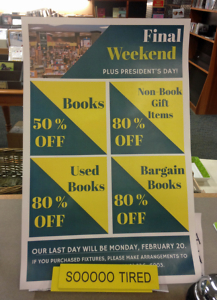 Working in that dying store was exhausting. For the first time I began to dread my shifts, and I knew how much worse it was for the full-time booksellers, not only because of their impending unemployment but also because of the strain of working in those conditions all day, every day. Nearly every customer we encountered during those last weeks was either expressing grief, wheedling for details about when the liquidation discount would go up, or trying to track down the owner so they could buy a bookcase or table. It was like hosting a seven-week-long wake—held in a flea market.
Working in that dying store was exhausting. For the first time I began to dread my shifts, and I knew how much worse it was for the full-time booksellers, not only because of their impending unemployment but also because of the strain of working in those conditions all day, every day. Nearly every customer we encountered during those last weeks was either expressing grief, wheedling for details about when the liquidation discount would go up, or trying to track down the owner so they could buy a bookcase or table. It was like hosting a seven-week-long wake—held in a flea market.
Finally it was time to excavate the basement, where many artifacts from the store’s long history lived. You want a signed photo of James McBride? That will be three dollars, please. Old section signs? Display posters? Furniture? It’s all for sale. EVERYTHING MUST GO, as the big yellow banner on the front doors reminded me every time I came in to work. It was excruciating to walk through the store and see price tags slapped on every little bit of our institutional history.
And almost from the jump, booksellers couldn’t really do the job we loved anymore. Books weren’t where they belonged, our display locations became immediately obsolete, we couldn’t place orders, and we hadn’t gotten new stock in weeks. When that rare butterfly came through the door, someone in search of a particular book and not a deal or a chance to say goodbye, we could seldom find the right book. Even more wrenching were the customers who wanted a recommendation, previously known as the best kind of customer. Sure, let me rattle off my favorites, but do you have a pen to jot them down? Because you’ll probably have to get them in a bookstore that isn’t dying a slow, painful death.
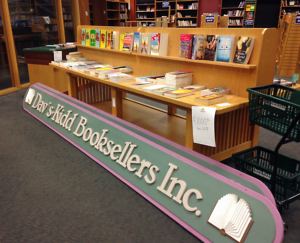 What kept our spirits partially aloft was the clandestine attempt to gather investors for a new store, an effort that began literally the day the liquidation was announced to the public. Though the makeup of that core group would change some—and all manner of ideas would be tossed around, many later forgotten—their efforts, which we heard about only in whispers here and there, provided us with a steady drip of optimism.
What kept our spirits partially aloft was the clandestine attempt to gather investors for a new store, an effort that began literally the day the liquidation was announced to the public. Though the makeup of that core group would change some—and all manner of ideas would be tossed around, many later forgotten—their efforts, which we heard about only in whispers here and there, provided us with a steady drip of optimism.
When the plan for a new store was officially—finally!—announced several weeks ago, what I felt was not surprise but immense relief, a huge exhalation of all the bad feelings I’d stored up during The Booksellers’ last days. Sure, the loss of the old store was a travesty, but this new store? This would be a true local. This store would be Memphis born and raised. This store would be ours.
A couple of weeks ago, I was thrilled to be able to attend a meeting between investors and the new store’s future staff. The investors include a core group of managing partners, the ones who’d been meeting nearly from the beginning of the liquidation process, and at least twenty other local investors they’d recruited, mostly longtime customers with some capital to spare.
The new store, we learned, would be called Novel. The tentative floorplans for the new space showed a store a little more than half the space of the old store but still right there in its old familiar spot in the Laurelwood Shopping Center. We met the designers and the architects involved, and we nibbled on a Rendezvous sausage-and-cheese plate. Many of my Booksellers coworkers were present, and there was an air of homecoming in the store. The release of the bookstore-less anxiety was palpable.
We’ll still have a generous magazine selection. We’ll have a big kid’s section and lots of comfortable places to sit down and read in good, natural light. We’ll have space for author events and a bistro. Best of all, there will be many familiar faces behind the register and on the sales floor. From their very first secret meeting, Novel’s future investors believed that retaining the staff of the old store was crucial for whatever new store they opened. And that’s just what they’ve done.
In many ways, the store will feel brand new. New ownership, a new floor plan, a new restaurant in the bistro space. But we, the familiar faces, will be in a familiar space, doing a familiar thing—pressing our favorite books into your hands. Everyone knows booksellers aren’t in it for the money, but it’s an amazing thing to be considered indispensable to a new business endeavor. When I think about the new store—stocked with new books and Memphis-made goods, the smell of fresh paint in the air, and almost every coworker’s face someone I already know and love—I get butterflies. A local independent bookstore that’s actually both local and independent? How Novel.

Kathryn Justice Leache lives Memphis, her hometown. Her life among books has included work as a librarian and stints as a bookseller at Square Books in Oxford, Mississippi, and The Booksellers at Laurelwood. She will soon be working at Novel, an independent bookstore opening in summer 2017 in Memphis.

